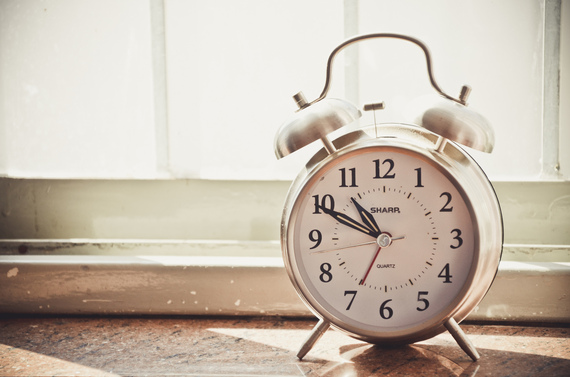By: Jolie Kerr
For many people, mornings can feel like the seventh circle of hell, a circle determined by biology: you either wake up amped to grind out another day, or you slog through it. But there are subtle ways you can shift yourself into the kind of person who relishes the wee hours of the day. Here's how.
Give yourself a reason to wake up
So you want to become a morning person? Great! Welcome to the club, we have freshly baked muffins.
Before embarking on the formation of this new habit, ask yourself why you want to become a morning person. Do you want to use the extra time in your day to work on a personal project, like writing a screenplay? Do you have a career goal that can be advanced by getting to the office earlier? Do you want to be a morning person so you can lord it smugly over your friends? Any of those are fine, but having a concrete reason why you're doing this thing, and reminding yourself of that reason, will be motivating come morning when that alarm starts blaring.
And also give yourself a reward for waking up
It's admirable to want to become a person who wakes up with the sun to go jogging. However, if you're not currently a morning person and also not currently a jogger, you're exceedingly unlikely to meet your goal. Instead of attempting to jump right into a daybreak jogging routine, start with a more reasonable enterprise by focusing on mastering the morning-person part of things. Once you've got that down, you can build on it by taking the challenge to the next level and incorporating the jogging.
Now then, if you love jogging so much you wish you lived in the '70s and could acceptably sport short-shorts, great. Jog away! Because setting up a new routine of waking up early will be much more successful if you give yourself something to look forward to. In concrete terms, that means setting that extra morning time aside for something you really love. Maybe it's catching up on your favorite TV show, or playing a video game, or sitting on the toilet and Snapchatting furiously.
Get some sleep, duh
Getting up in the morning will be so much less of a struggle if you've gotten enough sleep. For most adults, that's seven to nine hours -- you may already have an inkling of how much you need to feel your best, but if you don't, aim for eight hours and adjust up or down if necessary. The best way to ensure that you get enough sleep is to have a set bedtime, just like you used to have when you were a kid.
Now you have two numbers to work with to help you figure out what your bedtime should be: the eight hours of sleep you need to get and the time at which you're aiming to wake up. (Let's say that time is 6am for the sake of this exercise.) In order to get your eight hours in, you'll need to go to sleep at 10pm. Note that was "go to sleep" not "go to bed," ideally, you should have your teeth brushed, face washed, and jammies on by 9:30 or 9:45, to send a signal to your body that sweet dreams are on their way.
"OH HELL NO, I'M NOT GOING TO BED AT 9:30"
Oh, was that you back there yelling and carrying on? Mister I'm-Too-Cool-for-a-9:30-Bedtime? No problem, the sticker shock that comes along with taking a hard look at what waking up early entails is entirely normal and leads us right into this next suggestion on your path towards morning personism: take it in increments.
I used 6am as a sample wake-up time because it's a common one for people to latch onto. But if you're currently waking up at 8am, and only barely dragging yourself out of bed then, or if the idea of tucking into bed during the 9pm hour is totally unrealistic, shift your wake-up time to something less extreme. The idea here is that you're establishing a habit, and it's perfectly fine to do so gradually. Actually, it's more than fine -- it's recommended. So instead of leaping right into a wake-up call two or three hours earlier than what you're used to, try setting the alarm for 30 minutes, or even 15 minutes, earlier, then build up from there.

Credit: Flickr/HenriqueSimplico
Make good alarm choices
Are you a sound sleeper who needs an extra-loud alarm to wake you up? Get one. Do you need something less jarring to make rising a more gentle experience? Try an alarm that starts off low and increases with volume. Bells and chimes are good for this. Are you musically inclined? Use a radio alarm clock.
If you're a chronic snoozer, disable the snooze function on your alarm or use the old "put the alarm on the other side of the room" trick.
More from Thrillist:
Like Thrillist on Facebook: www.facebook.com/Thrillist

